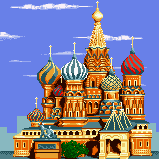St. Basil's Cathedral: Difference between revisions
No edit summary |
m (→Trivia) |
||
| Line 8: | Line 8: | ||
*The pamphlet information (above) wrongly states that the cathedral was built by [[Wikipedia:Ivan III of Russia|Ivan III]]. Actually, it was [[Wikipedia:Ivan the Terrible|Ivan IV]] who commissioned it (and who is the one known as "Ivan the Terrible"; Ivan III would be known as "Ivan the Great"). | *The pamphlet information (above) wrongly states that the cathedral was built by [[Wikipedia:Ivan III of Russia|Ivan III]]. Actually, it was [[Wikipedia:Ivan the Terrible|Ivan IV]] who commissioned it (and who is the one known as "Ivan the Terrible"; Ivan III would be known as "Ivan the Great"). | ||
{{Earth}} | {{Earth}} | ||
{{MIM}} | |||
[[Category:Mario is Missing! Landmarks]] | [[Category:Mario is Missing! Landmarks]] | ||
[[Category:Buildings]] | [[Category:Buildings]] | ||
Revision as of 02:14, January 21, 2018
St. Basil's Cathedral (Russian: Собор Василия Блаженного, Sobor Vasiliya Blazhennogo) is a famous church in Moscow known for its so-called onion domes. One of those Chapel Domes has been stolen by Koopa Troopas in Mario is Missing!, and Luigi has to return it to St. Basil's. He is rewarded 2,250 dollars for doing so, plus a bonus of 3,000 dollars if it is returned first.
Pamphlet Information from Mario is Missing!
This strange and wonderful church was built in 1555 by Duke Ivan III[sic], known as Ivan the Terrible. He ordered the church built to honor the holy fool, St. Basil. (Holy fool is the name for a saint in Russia.) The famous 'onion' domes were added later in the 16th century. Although the church appears to have no real design, the building was carefully built as one large chapel surrounded by eight, dome-topped chapels. Every room is painted in different patterns and colors.
Trivia
- The pamphlet information (above) wrongly states that the cathedral was built by Ivan III. Actually, it was Ivan IV who commissioned it (and who is the one known as "Ivan the Terrible"; Ivan III would be known as "Ivan the Great").
